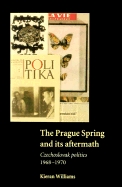Book contents
- Frontmatter
- Contents
- Preface
- List of abbreviations
- Part I Liberalization, intervention, and normalization
- Part II January 1968–December 1970
- 4 The erosion of Soviet trust
- 5 The failure of Operation Danube
- 6 Dubček's normalization
- 7 The realist ascendancy
- 8 The security police in the Dubček period
- 9 After Dubček
- Select bibliography
- Index
7 - The realist ascendancy
Published online by Cambridge University Press: 05 July 2011
- Frontmatter
- Contents
- Preface
- List of abbreviations
- Part I Liberalization, intervention, and normalization
- Part II January 1968–December 1970
- 4 The erosion of Soviet trust
- 5 The failure of Operation Danube
- 6 Dubček's normalization
- 7 The realist ascendancy
- 8 The security police in the Dubček period
- 9 After Dubček
- Select bibliography
- Index
Summary
The Palachiáda deepened the splits in the ruling élite. Dubček (sidelined by flu from 18 January until 4 February) and Smrkovský were increasingly isolated while Černík, Štrougal, Svoboda, and Husák formed within the reform coalition the core of a ‘realist’ faction that was expanding to include more politicians who shared their crisis fatigue. This group still supported Dubček's attempts to convince the public that discipline and unity would protect reforms against Soviet and hardline subversion, but they added that problems lay also in certain revisionist ideas and spokesmen, and that only by correcting these deformations could reforms proceed. The result of this ‘realism’ was the fall of Dubček.
A veneer of calm settled on the country after the Palach crisis, even though the first quarter of 1969 marked the apogee of independent currents in the working class. Despite a government freeze on workers' councils in October 1968 and its reluctance to submit an enterprise law that would give the councils a legal footing, free elections went ahead and by January 1969 they were in place in 120 enterprises, representing almost 900,000 employees. The councils consisted primarily of men aged thirtyfive to fifty and working in technical or managerial positions. About half of them were party members, and about one-third had tertiary education (compared to only one-fifth of enterprise directors). Representatives of these councils met in Plzeň on 9–10 January to consult and establish a coordinating committee.
- Type
- Chapter
- Information
- The Prague Spring and its AftermathCzechoslovak Politics, 1968–1970, pp. 192 - 209Publisher: Cambridge University PressPrint publication year: 1997



